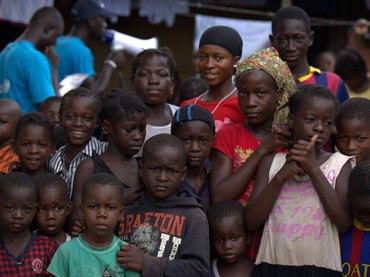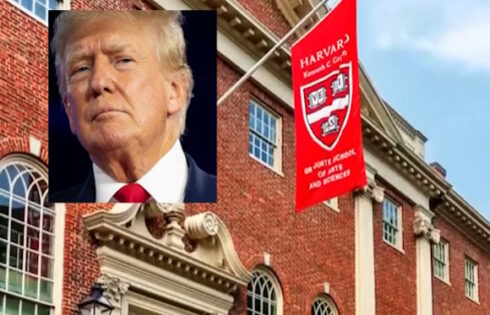
Ebola worries led two reporters to cancel their stateside visit
Point Loma Nazarene University was the only American stop for a group of African journalists who came to share their experiences and learn about journalism in the United States.
It wasn’t because the Christian college has the only journalism program worth visiting: Ebola panic led the University of South Florida-St. Petersburg, the other stop, to cancel its events with the visiting journalists.
The African journalists, who are participating in the U.S. State Department’s Edward R. Murrow Program for Journalists, hail from Ethiopia, Kenya, Botswana, Lesotho, Republic of South Sudan, Nigeria, South Africa, Zimbabwe, Rwanda and Swaziland. Two of the initial 14, from Ebola-stricken Sierra Leone and Liberia, canceled their trips.
“This is the only university they’re visiting in the entire nation,” Point Loma journalism professor Dean Nelson said to kick off the Nov. 7 event, which was styled as a Q-and-A with other journalism faculty.
African journalists struggle with issues such as government corruption on a daily basis, they said.
Dealing with government officials is challenging because they tend to ignore questions and refuse interviews, said Lerato Matheka, entertainment reporter with Public Eye in Lesotho. “We at times have to publish a story without their comment and sometimes that forces them to respond.”
African journalists face restrictions from the government and bribery to change story angles, and “some journalists take bribes from officials to kill stories and that affects credibility and professionalism,” said Matheka. Editors are also faced with bribery and may cut a story without telling the reporter, he said.
The government funds private media organizations that many of the journalists work for, so they are careful when they publish stories – that sometimes means information may not be accurate, the journalists said.
If a story does not highlight a government official, advertisements that fund the news organization will be cut, and the government will refuse future interviews, Matheka said. “We always have to tone down the exposure of our stories,” which Matheka called “one of the most critical issues.”
Vera Samuel Anyagafu, foreign desk correspondent with The Vanguard in Nigeria, said that “Africans know more about Americans than Americans know about Africans.”
Much of America’s media focuses on events happening inside the United States unless there is a major outbreak abroad, Anyagafu said. “America is the leader for freedom but your media is inward looking.”
In America, “there is ignorance in how Ebola is transmitted,” said Olive Burrows, a reporter from Capital FM in Kenya.
“A lady who treated patients with Ebola took a bike ride and then it’s suddenly huge news with media following her, and even police,” Burrows said, referring to the quarantine of nurse Kaci Hickox in Maine. “It’s a bit ridiculous.” Other African journalists agreed.
The journalists from Sierra Leone and Liberia would have offered an interesting view, as they face different limitations in journalism and have witnessed Ebola firsthand, Burrows said, calling their cancellation “regrettable.”
“They would have given us a wealth of information about how the whole thing was handled and what their thoughts are and what lessons they’ve learned and all that. It would have been amazing to have them on the trip,” Burrows said.
African journalists had many questions about journalism in America. Matheka asked the Point Loma faculty for their “views on social media in relation to time and accuracy.”
“Transparency is the new form – the viewer has to make their own decisions and think things through,” answered journalism professor Stephen Goforth.
“But anyone with a smartphone can now publish something and become a journalist – we call it citizen journalism; it is a common way people find out news,” said Nelson. Citizen journalism often includes information that is less than accurate, but the main point of the story is shared, he said.
Hearing from PLNU’s journalism professors, Burrows shared hope that “if we work at it, we can get up to the same pace as you.
“We imagine America to be this land of milk and honey,” Burrows added. “It’s been good to see some of the imperfections of your system, and it’s just like any other country in the world,” said Burrows.
Point Loma plans to host the African journalists again in a year.
The University of South Florida-St. Petersburg canceled its event with the African journalists “out of upmost caution,” Han Reichgelt, regional vice chancellor of academic affairs, wrote in a letter to journalism school faculty, students and staff, according to the journalism think tank Poynter.
The school knew that none of the 12 who traveled to the U.S. came from Ebola hotspots Sierra Leone or Liberia.
Journalism schools at Syracuse University and the University of Georgia were also supposed to host journalists who had recently been in Liberia, but cancelled their events out of fear of the virus spreading.
College Fix reporter Samantha Watkins is a student at Point Loma Nazarene University.
Like The College Fix on Facebook / Follow us on Twitter
IMAGE: UNICEF Guinea/Flickr





Please join the conversation about our stories on Facebook, Twitter, Instagram, Reddit, MeWe, Rumble, Gab, Minds and Gettr.